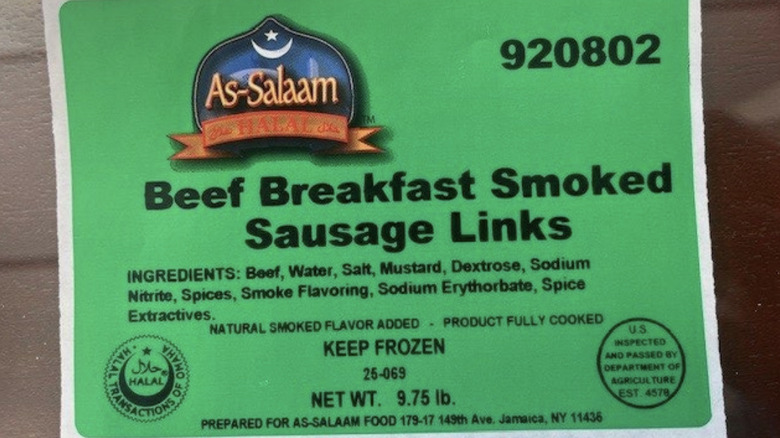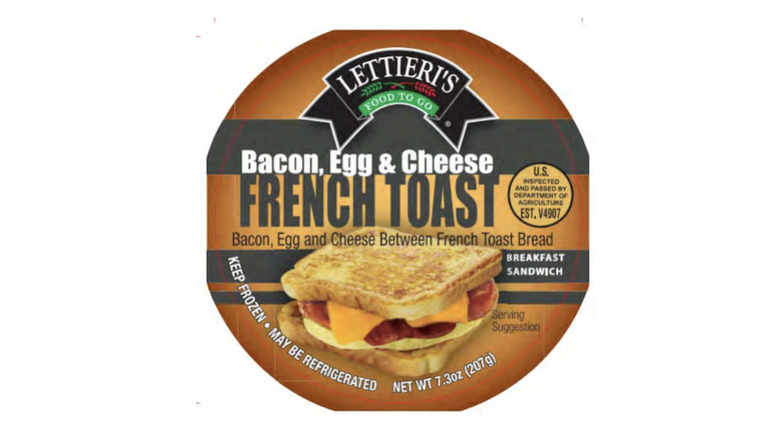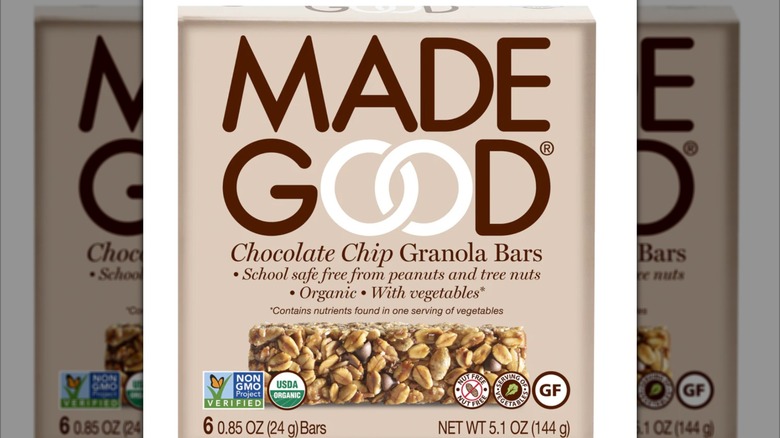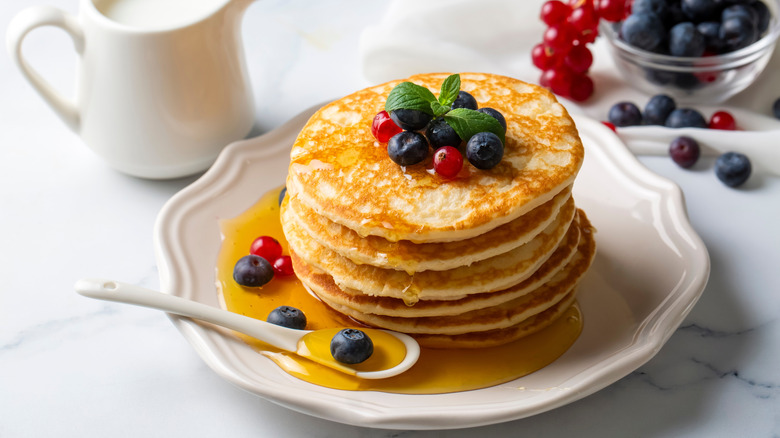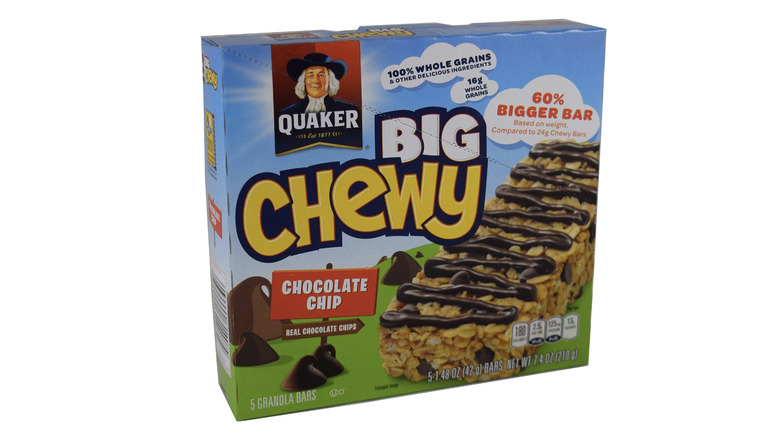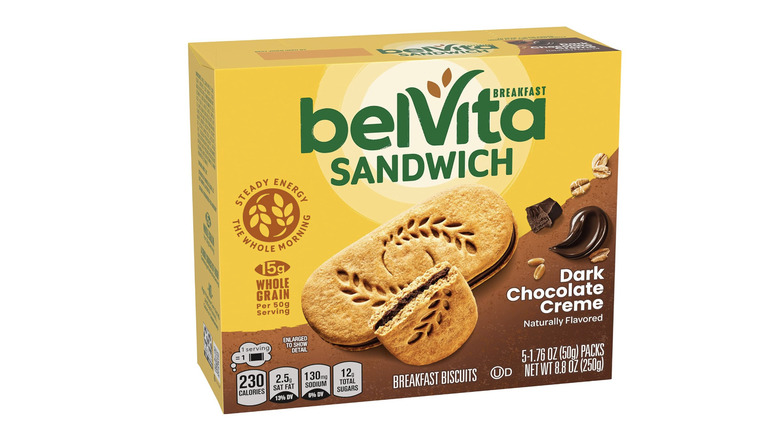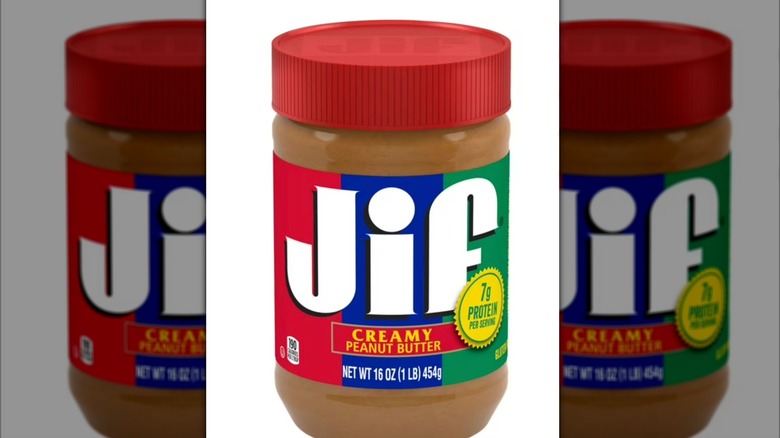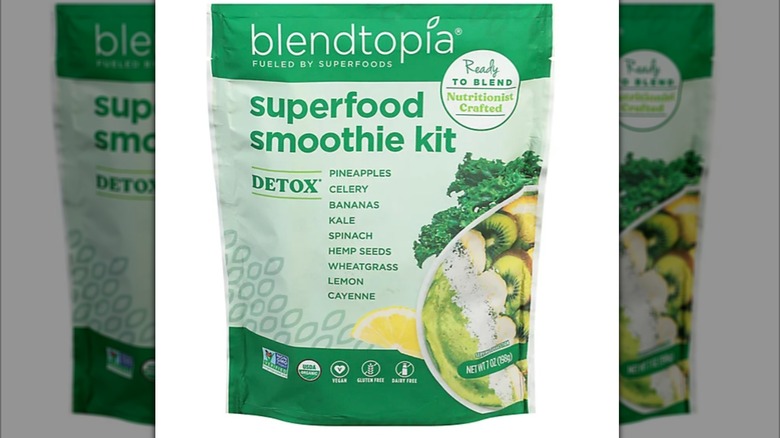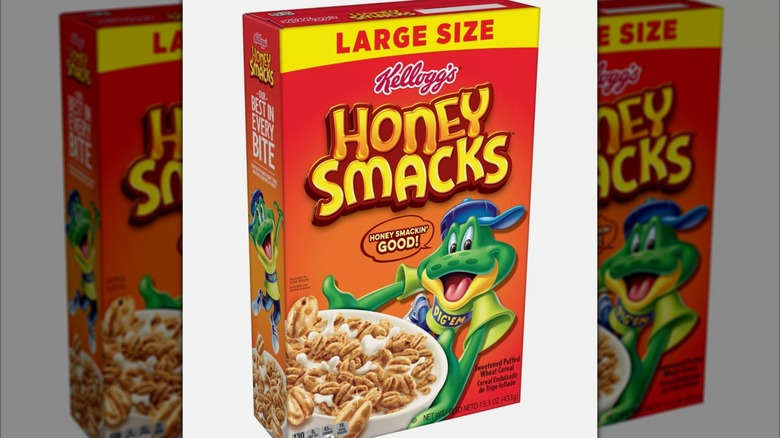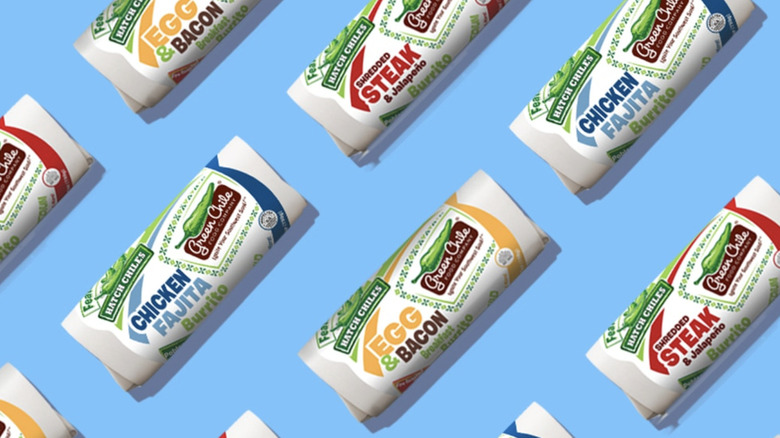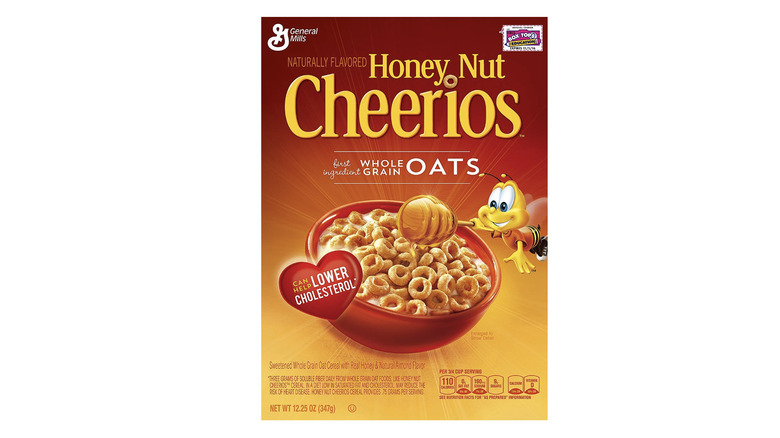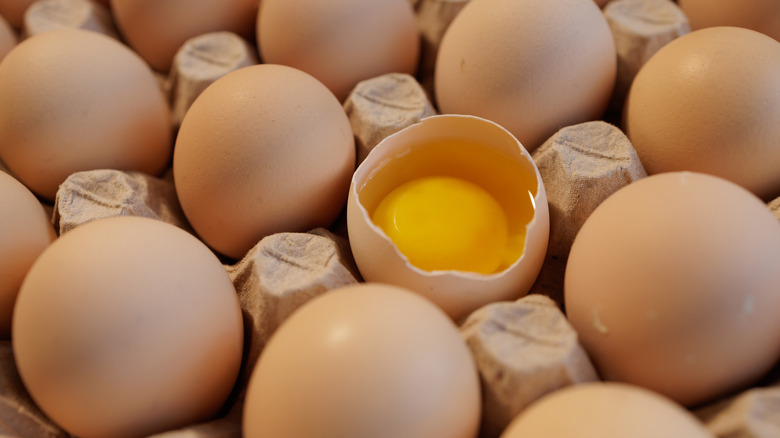Breakfast Food Recalls That Affected Millions
We may receive a commission on purchases made from links.
They say that breakfast is the most important meal of the day. Not only does it provide your body with essential nutrients, but it also kickstarts your metabolism and provides much-needed sustenance until lunch. Whether it's jam on toast, a stack of easy, three-ingredient pancakes, or a protein-packed smoothie bowl, the small culinary choices you make in the mornings can set the tone for the entire day. Unfortunately, even the most comforting breakfast staples can come with unexpected risks.
One of the main causes of breakfast food recalls is contamination with harmful bacteria such as salmonella or listeria. Several breakfast items have also been pulled from grocery store shelves after consumers reported finding foreign matter — such as metal or plastic fragments — in their food. Other breakfast products may be recalled due to undeclared allergens, whether stemming from mislabeling or accidental cross-contamination during the manufacturing process.
Ready to find out what breakfast items triggered some of the biggest recalls in U.S. history? Here are some of the most shocking breakfast product recalls to hit the supermarkets!
August Egg Company recalls eggs due to potential presence of salmonella (2025)
Whether scrambled, fried, boiled, or poached, eggs are a delicious and convenient addition to any breakfast ritual. They are also packed with protein, vitamins, and choline, an essential nutrient that supports brain function. However, all these health benefits mean little if the eggs you are consuming pose the risk of harmful bacteria. Unfortunately, this was precisely the problem when August Egg Company recalled its eggs in June 2025.
The alert was raised after August Egg Company's eggs were linked to a salmonella outbreak, which affected over 100 people and led to at least one death. All in all, the company pulled 1.7 million dozen brown cage-free and certified organic eggs from supermarket refrigerators. The eggs had been sold under a range of brand names, including O Organics, Nulaid, Marketside, Simple Truth, and Sunnyside. The recalled product was available at Save Mart, FoodMaxx, Lucky, Smart & Final, Safeway, Raleys, Food 4 Less, and Ralphs in California and Nevada. The eggs were also shipped to Walmart stores in California, Washington, Nevada, Arizona, Wyoming, New Mexico, Nebraska, Indiana, and Illinois.
While it's unclear how the salmonella bacteria ended up in the eggs, August Egg Company ceased selling fresh eggs immediately after discovering the possible link between the pathogen and its products. Instead, the company started sending its eggs to an egg-breaking facility where they were pasteurized to kill any pathogens.
Smith Packing recalls breakfast sausages due to excessive sodium nitrate (2025)
Founded in 1911, Smith Packing is the brand name behind a range of meat products, such as sliced meats, chops, ground beef, meatballs, bacon, and sausages. In 2025, the company's products became the focus of an investigation after consumers complained about their appearance and taste. As it turned out, the issue stemmed from overly high levels of sodium nitrate.
The affected products included As-Salaam Beef Breakfast Sausage, as well as other meat items, including Smith Packing Beef Knockwurst, Honest John HJ Polish Sausage, and Beefland USA Regular Beef Sausage. While sodium nitrate is commonly added to cured meats, excessive amounts of the preservative can lead to safety concerns. Individuals who ingest too much sodium nitrate can experience nausea and dizziness, as well as more severe reactions. In total, Smith Packing recalled nearly 19,000 pounds of ready-to-eat breakfast sausages and other meat and poultry products manufactured between February 19, 2025, and April 24, 2025.
Hearthside Food Solutions recalls ready-to-eat breakfast sandwiches due to undisclosed allergen (2025)
Ready-to-eat, frozen breakfast sandwiches are the ultimate convenience, offering a filling and satisfying meal with minimal preparation. While that may be true, it's crucial that consumers — especially those with food allergies or sensitivities — can trust the labeling on such products. Unfortunately, in 2025, a labeling oversight by Hearthside Food Solutions resulted in the distribution of frozen breakfast sandwiches that contained undeclared sesame.
Recognized by the FDA as one of the nine major food allergens — alongside milk, eggs, fish, shellfish, tree nuts, peanuts, wheat, and soybeans — sesame can cause severe reactions and even death in sensitive individuals. As such, the seed must be clearly listed in the ingredient section of product labels. In this instance, sesame was not declared on the packaging of two specific products: Lettieri's Food to Go Sausage, Egg & Cheese French Toast Breakfast Sandwich and Lettieri's Food to Go Bacon, Egg & Cheese French Toast Breakfast Sandwich. In total, approximately 500,000 pounds of the breakfast sandwiches were recalled from Army & Air Force Exchange Services sites across the U.S.
Riverside Natural Foods recalls granola bars due to fears of metal contamination (2024)
Made from a mixture of rolled oats, sweeteners like honey or corn syrup, and other ingredients, such as nuts, seeds, and dried fruit, granola bars have become a popular addition to morning routines. In 2024, the breakfast snack was thrust into the spotlight after Riverside Natural Foods issued a recall involving over 2.4 million cases of its MadeGood Granola Bars due to concerns about metal contamination.
The affected products encompassed a range of granola bar flavors, including chocolate chip, mixed berry, strawberry, cookies and crème, and chocolate banana. The breakfast products were manufactured between January and November 2024 and shipped across the U.S., as well as Canada and other international markets. The product alert was raised after several consumers complained about finding pieces of metal in their granola bars. Luckily, no injuries were reported at the time.
The FDA gave the Riverside Natural Foods granola bar recall a Class II designation, indicating that it was moderately serious. A Class II recall pertains to "a situation in which use of, or exposure to, a violative product may cause temporary or medically reversible adverse health consequences or where the probability of serious adverse health consequences is remote."
TreeHouse Foods recalls waffles and pancakes due to listeria risk (2024)
In 2024, TreeHouse Foods announced a recall of approximately 200 different waffle and pancake products under a range of brand names due to possible contamination with listeria. Some of the brand names included in the recall were Best Choice, Always Save, Breakfast Best, Food Lion, Full Circle, Giant Eagle, and Great Value — though this represents only a fraction of the affected brands. The Belgian-style waffles, frozen toaster waffles, and pancakes were all produced at the same plant and shipped across the U.S. and Canada.
Listeria is a foodborne pathogen that may cause unpleasant symptoms like nausea, abdominal pain, diarrhea, fever, and headache. The bacteria can be especially dangerous for the elderly, young children, and individuals with compromised immune systems, potentially leading to hospitalization and even death. The pathogen also poses risks during pregnancy, as it can cause miscarriages and stillbirths.
The Quaker Oats Company recalls various breakfast items due to possible salmonella contamination (2023 and 2024)
One of America's oldest and most iconic oat and breakfast product manufacturers, the Quaker Oats Company evolved from the German Mills American Cereal Company, which was founded in 1850. The American Cereal Company changed its name to The Quaker Oats Company in 1901. Unfortunately, even well-established companies sometimes make mistakes, as demonstrated by Quaker's 2023 and 2024 food safety alert.
The Quaker recall began in December 2023, when the company announced that it was recalling its granola bars and granola cereals over fears of possible salmonella contamination. The following month, in January 2024, the recall was widened to include additional cereal and granola bars, cereals, and snack boxes. The breakfast products were distributed across the U.S., as well as Puerto Rico, Guam, and Saipan. It's unclear how the pathogen made its way into the products, but the recall was a significant one, given the number of affected products and their wide distribution.
Mondelēz Global recalls belVita breakfast sandwiches due to undeclared peanuts (2023)
Undeclared allergens are one of the biggest reasons for food recalls. The problem typically stems from labeling mistakes or cross-contamination during processing. In 2023, Mondelēz Global pulled two types of breakfast sandwiches from supermarket shelves due to possible cross-contamination, after it was discovered that they were produced using equipment that also handled peanuts. The issue came to light during an internal inspection conducted as part of the company's food safety protocol.
The affected products were the belVita Breakfast Sandwich (Dark Chocolate Creme) and the belVita Breakfast Sandwich (Cinnamon Brown Sugar with Vanilla Creme). The products were sold in grocery stores throughout the U.S. At the time of the recall, three cases of allergic reactions were supposedly linked to the tainted breakfast sandwiches.
Peanut allergies can be debilitating, with common symptoms including hives, swelling, diarrhea, nausea, vomiting, and shortness of breath. In more serious cases, the allergy can lead to anaphylaxis, a life-threatening reaction that can cause chest pain, rapid pulse, dizziness, and difficulty swallowing and breathing.
J.M. Smucker recalls Jif Peanut Butter following outbreak of salmonella (2022)
Whether spread on toast, stirred into oatmeal or yogurt, or added to smoothies, peanut butter pairs well with other breakfast staples. Unfortunately, in 2022, the versatile ingredient came under scrutiny after it was linked to an outbreak of salmonella. In total, at least 21 people became sick after eating Jif Peanut Butter or products that contained the ingredient, four of whom were hospitalized. The tainted spread was manufactured at J.M. Smucker's facility in Lexington, Kentucky.
Since Jif Peanut Butter was used as a base for various processed foods, the recall spread rapidly to cover a broad range of products. These included candies, protein power snacks, and baked items. As for J.M. Smucker, the company had to withdraw almost 50 of its products from the market, lowering its projected earnings per share for the fiscal year 2023 from $8.91 to between $7.85 and $8.25.
Over a decade before the 2022 incident, J.M. Smucker recalled its Jif Peanut Butter for precisely the same reason. In 2011, the company issued a recall of its Smucker's Natural Peanut Butter Chunky due to fears over potential salmonella contamination. Let's hope that J.M. Smucker has finally learned from its mistakes.
Blendtopia recalls smoothie kits due to possible listeria contamination (2020)
Over the recent years, smoothies have become a popular breakfast choice due to their convenience, versatility, and health benefits. To make mornings even easier, some companies have come up with smoothie kits — frozen, pre-portioned packs of ingredients ready to be tossed into a blender.
In 2020, Blendtopia recalled a range of its smoothie kits after a notification from an ingredient supplier about potential listeria contamination. It's unclear what ingredient was affected, but the recall included several Blendtopia smoothie kits, including "Glow," "Detox," "Energy," "Immunity," and "Strength." As a result of the potential risk, Blendtopia recalled more than 29,000 cases of the products. The smoothie kits were distributed to retailers throughout the U.S. and were also sold online. No reports of adverse health effects were linked to the smoothies at the time, and the company recalled the items as a preventative measure.
Kellogg Company recalls Honey Smacks Cereal due to salmonella concerns (2018)
Founded in 1906 as the Battle Creek Toasted Corn Flake Company after its founder W.K. Kellogg developed flaked cereal, Kellogg's got its current name in 1922. Over the decades, the company expanded its line of products to include other cereals, snacks, and convenience items. Despite its long track record and wide range of breakfast offerings, Kellogg's hasn't been immune to food safety issues.
In 2018, the company announced a recall of the Kellogg's Honey Smacks cereal after the breakfast product was linked to a salmonella outbreak. Kellogg's Honey Smacks were shipped to stores throughout the U.S., as well as Costa Rica, Guatemala, Mexico, the Caribbean, Guam, Tahiti, and Saipan. In total, at least 135 consumers in the U.S. were sickened after eating the cereal, with at least 34 individuals ending up hospitalized.
While the cereal bore the Kellogg's brand name, it was actually produced by a third-party — Kerry. In 2023, five years after the salmonella outbreak, the company admitted to producing cereal in unsanitary conditions at its former Gridley plant in Illinois, and was ordered to pay $19.2 million in fines.
Green Chile Food Company recalls frozen breakfast burritos due to possible presence of listeria (2017)
Billing itself as "one of the fastest growing Southwest cuisine brands," Green Chile Food Company has been around since 2014. The company specializes in "bold" and flavor-filled Southwest-style burritos. In 2017, Green Chile Food Company came under scrutiny after a routine inspection of its facilities by FSIS found listeria in one of its beef and potato burritos.
In total, the recall involved approximately 15 different Green Chile burrito products, including a range of fillings like egg and sausage, egg and bacon, beef and bean, steak and jalapeño, and bean and cheese. The burritos were sold frozen and refrigerated in grocery stores in California, Illinois, Oregon, and South Dakota. They were also served hot in convenience stores and vending machines. Luckily, no illnesses were linked to the burritos at the time of the recall. The food alert came shortly before the Green Chile Food Company was scheduled to relocate to a new manufacturing location with a higher production capacity and better infrastructure.
General Mills recalls Cheerios cereal due to undeclared wheat (2015)
The food giant behind popular brands like Betty Crocker, Yoplait, and Gold Medal, General Mills is one of the biggest food manufacturers in the world. However, size and reputation don't necessarily make a company immune to blunder. In 2015, General Mills announced a recall of Cheerios and Honey Nut Cheerios after the gluten-free products were found to contain wheat. The cereal was produced at a plant in Lodi, California, where wheat flour was accidentally used in equipment reserved for processing gluten-free oat flour.
This type of mistake is particularly troubling because it poses a risk to individuals with celiac disease or gluten intolerance, who depend on accurate labeling to protect their health. To mitigate the health risks, General Mills pulled 1.8 million boxes of the cereal from supermarket shelves. The FDA gave the Cheerios recall a Class I designation, indicating that it could lead to serious health risks or even death, if consumed by individuals allergic to wheat.
Quality Egg recalls eggs after a salmonella outbreak (2010)
Egg recalls are not uncommon. However, the Quality Egg recall of 2010 was one of the largest ever to hit the U.S. In fact, the company ended up withdrawing a staggering 550 million eggs from the market after they were linked to nearly 2,000 salmonella cases throughout the country, with estimates suggesting up to 60,000 unreported cases. This widespread scope of contamination isn't surprising since the eggs were distributed in Arkansas, California, Iowa, Illinois, Indiana, Kansas, Minnesota, Missouri, Nebraska, North Dakota, Ohio, South Dakota, Texas, and Wisconsin.
The eggs were sourced from two egg production facilities in Iowa — Wright Country Egg and Hillandale Farms. Both facilities were owned by DeCoster Egg Farms. After conducting testing at the facilities, the FDA discovered traces of salmonella on the walkways, factory equipment, as well as in the chicken feed and manure. The FDA Commissioner, Margaret Hamburg, told CNN at the time: "There's no question these farms involved in the recall were not operating with the standards of practice we consider responsible."
In 2014, Quality Egg executives, Austin "Jack" DeCoster and his son Peter DeCoster, pleaded guilty to several charges, including distributing contaminated eggs, falsifying expiration dates, and bribery. Quality Egg received a $6.79 million fine and three years of probation, while Jack and Peter DeCoster received three‑month prison sentences and $100,000 fines each.


